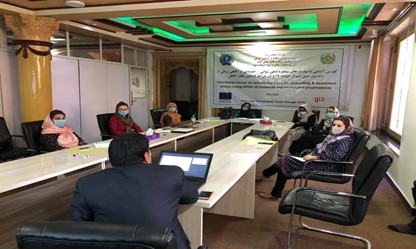
Introduction
In Afghanistan, the COVID-19 pandemic has had an impact on the mental health of the population primarily due to the stress caused by the movement restrictions and inaccurate and unverified information shared in the media including social. The main burden fell on vulnerable groups and low-income households. Among other things, the pandemic hindered academic progress for children and also led to an increase in domestic violence.
At the initial phases of the pandemic, patients were unable or reluctant to visit mental health facilities due to movement restrictions and fear of infection, leading to disruptions in treatment and care plans. Movement restrictions also led to the disruption of the procurement of psychotropic medications.
The Ministry of Public Health is implementing the national mental health and psychosocial support COVID-19 response plan in collaboration with local and international nongovernmental organizations, guided by a policy brief developed by the Science, Epidemiology and Research Committee.
Education, awareness and mental health promotion
Mental health and psychosocial support guidance materials, developed by WHO and the Inter-Agency Standing Committee (IASC), on COVID-19 were translated into local languages and disseminated among relevant actors. In addition, flyers and posters with tips on self-care for various groups (adults, children, health workers and elderly), and availability of remote psychosocial support were developed and distributed.
Remote mental health and psychosocial support services
Six hotlines were launched in May to provide remote mental health and psychosocial support. Currently, there are 65 hotlines operational across the country – 38 in the public sector and the rest is managed by the civil society. The support they provide varies from awareness raising and education on self-care to brief psychosocial counselling and referral to specialized services. The hotlines are served by psychosocial counsellors, psychologists and psychiatrists (hotline numbers: +937 2907 0605; +937 0658 6464; +937 8563 7133 (male); +937 8515 9208 (female).
Additionally, operators manning the COVID-19 hotlines offer assessment of mental wellbeing, provide support or referral to services, if needed.
Along with hotlines, there is also an online psychosocial counselling platform provided by an INGO IPSO. The service is supported by a team of three psychosocial counsellors.
All remote psychosocial support services were advertised through social media platforms, COVID-19 hospitals and units (corridors, clinics, waiting areas), and in public places such as mosques and markets.
To provide targeted interventions for persons affected by COVID-19, the Department of Surveillance provided the Department of Mental Health with a list of people who tested positive for COVID-19, and their phone numbers. These people were contacted and offered distance psychosocial counselling/support. Almost 8600 persons have received psychosocial support so far
Mental health and psychosocial support in COVID-19 hospitals
Mental health units were established in six COVID-19 hospitals from February to May. These units provided mental health and psychosocial support to healthcare workers and families of COVID-19 patients. Each unit was run by one or two psychosocial counsellors, psychologists or psychiatrists. The service in COVID-19 hospitals in Kabul and Herat provided face-to-face support whilst teams in Balkh, Patkia and Nanagarhar offered telephone consultations.
Ensuring continuity of services
All mental health workforces in primary healthcare centers and general hospitals are maintaining their services during the pandemic. Healthcare providers are also being encouraged to offer remote support and promote self-care among patients.
Conclusion
The COVID-19 pandemic and the resulting movement restrictions have had a noticeable impact on the mental wellbeing of the population, as well as mental health care in Afghanistan. Despite the lack of resources and sustainable funding, national health authorities and nongovernmental organizations managed to offer a comprehensive set of support services. Both traditional and modern approaches were employed by mental health and psychosocial support service providers, to deliver these services to people who need it most.
Community engagement has been instrumental in the mental health and psychosocial support response during this pandemic. It is crucial to build on this momentum going forward, to improve access and minimize the stigma associated with mental health. It is also important to scale up the capacity of frontline workers including health care workers, to provide psychosocial interventions to people in need.
Related links
Afghanistan: mental health and psychosocial support during #COVID19
Afghanistan Capacity Development and Educational Organization (ACDEO)
Department of Mental Health, Ministry of Public Health (Facebook)
IPSO ECARE: the professional safe psychosocial helpline
Medica Afghanistan: Psychosocial and health program
Ministry of Public Health: Presentation 1 (YouTube)
Ministry of Public Health: Presentation 2 (YouTube)
Ministry of Public Health: Presentation 3 (YouTube)


